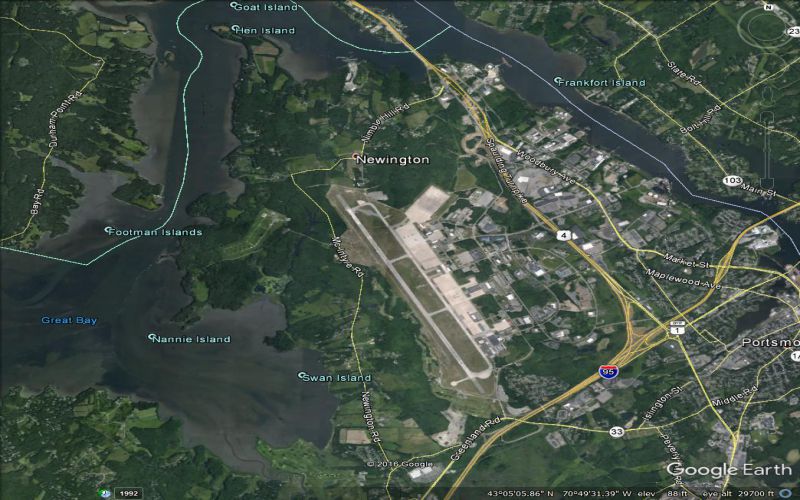
Pease dominates the landscape of Great Bay and the Piscataqua River.
January 11, 2019 (CONCORD, NH) – Conservation Law Foundation (CLF) and Pease Development Authority (PDA) have reached an agreement in a lawsuit focused on Clean Water Act violations at Pease International Tradeport, the site of the former Pease Air Force Base in Portsmouth and Newington. Significant development has made the Pease Tradeport a major source of stormwater pollution that has degraded the health of local waters.
“Stormwater pollution is one of the greatest threats to the health of Great Bay,” said Tom Irwin, VP and Director of CLF New Hampshire. “This historic agreement ensures that the Pease Development Authority will be playing by the same rules as communities throughout the Seacoast and will comply with the Clean Water Act. The health and safety of our waters is essential to our communities and our economy. No one has a right to pollute them.”
Stormwater runoff contains numerous pollutants, including nitrogen – the pollutant of greatest threat to the Great Bay estuary – as well as metals, bacteria, and petroleum products. In addition, highly toxic Per- and Polyfluoroalkyl substances (PFAS) have been found at the Pease International Tradeport, including in brooks located at the site. PFAS are suspected carcinogens that have been linked to a variety of severe health problems.
The agreement, which resulted from a court-administered mediation process in the U.S. District Court for the District of New Hampshire, requires PDA to apply for and obtain a Clean Water Act permit regulating discharges from the site’s municipal separate storm sewer system (MS4). PDA will be required to implement a number of programs for managing stormwater pollution as well.
PDA must also reduce stormwater pollution from existing or future development, assess the presence and toxicity of PFAS chemicals in aquatic plant and animal communities, and implement a pilot project to evaluate emerging technologies that may be used to reduce PFAS contamination in surface waters at Pease International Tradeport.
The agreement includes a payment to cover CLF’s litigation costs and CLF will direct a portion of this payment to projects focused on the restoration and protection of Great Bay.
CLF was represented by in-house counsel Zak Griefen, Tom Irwin and Chris Kilian in this case. Seth Kerschner, Matthew Wisnieff, and Trisha Grant of global law firm White & Case LLP also represented CLF pro bono.
CLF’s Clean Water Act lawsuit against PDA is the first of its kind in requiring a redeveloped military base to obtain an MS4 permit to reduce stormwater pollution, and in requiring the piloting of technologies to reduce PFAS pollution.
You can read a PDF of the notice of settlement and a PDF of the settlement agreement.
CLF experts are available for further comment.
###
